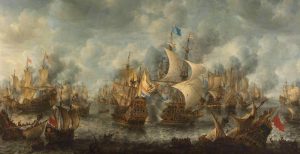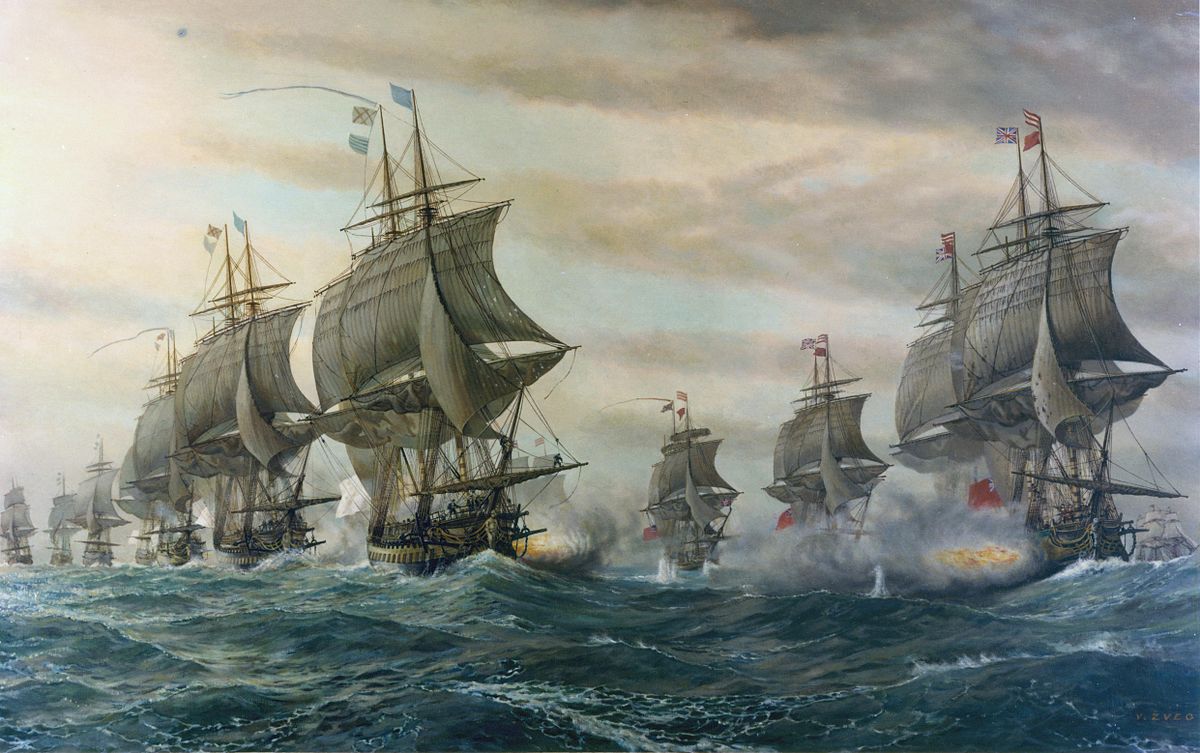By the early Nineteenth Century, the British Navy was the unquestioned leader on the seas. No other nation, or group of nations, was able to compete with their naval supremacy. “For almost 30 years after the battle of Trafalgar in 1805, British naval dominance was so great that it is not much of an exaggeration to say that it had no serious rivals” (Stoll, p. 266). Using this advantage, the British Empire grew, absorbing new colonies across the world, and exporting British culture to them. Not content to simply possess colonies, England strove to advance the colonies’ trade, culture, society, and economies (James, p. 169).
Along with the naval power, Britain relied upon “native inventiveness and application” of the British people, which drove them to mold their colonies in their image. Related to this, British industry came to dominate the world. With the naval supremacy, these other characteristics led to British penetration into new markets, where “Britain appeared as a colossus astride the world” (James, p. 169). Finally, the Christian character of the nation served as an underpinning for all of the other characteristics, as it demanded “personal integrity, hard work, and concern for all humans (James, p. 170; 185).
 It is easy to see that this altruistic dedication to hard work and integrity furthered the inventive nature of the people, which benefited the growing industrial endeavors. All of these alone would have made Britain a force to be reckoned with, but with the addition of the Naval power, these aspects were not contained in Britain, but were exported world-wide. Britain came to have a universal world view, with British leaders “debating the impact of specific British policies on the economic well-being of [native people] (Hatekar, p. 469). Slavery became a major concern, and was eventually abolished – first the slave trade, then the practice itself (James, p. 185ff).
It is easy to see that this altruistic dedication to hard work and integrity furthered the inventive nature of the people, which benefited the growing industrial endeavors. All of these alone would have made Britain a force to be reckoned with, but with the addition of the Naval power, these aspects were not contained in Britain, but were exported world-wide. Britain came to have a universal world view, with British leaders “debating the impact of specific British policies on the economic well-being of [native people] (Hatekar, p. 469). Slavery became a major concern, and was eventually abolished – first the slave trade, then the practice itself (James, p. 185ff).
The money that England made from colonies, industry and trade allowed for a strong commercial core. Britain served as the world financial center, with banking, stockbroking, and insurance as the mainstays, though Ward claims that essentially “the ‘transactions sector’ acted as a handmaiden to growth” (p. 61). Since Britain was no longer an agricultural society, but industrial, the sea power allowed for foodstuffs to be imported from colonies and other nations, while supporting the exporting of people, capital, and industrial products (James, p. 170-172). Contemporary authors saw the British economic power as transformational, saying that “the language of economics [was used] to push the agenda of modernising indigenous society” (Hatekar, 471).
While the colonies were central to the planning, much trade took place with other nations, both large and small. Since Britain was the financial and naval power, it was very influential, even in non-colonies, leading to the formation of an “informal empire” where local governments might or might not be supportive of British financial goals (James, p. 173). This informal nature included wars to further British advancements, especially in China, as it would be good for business (James, p. 177). By the early 1820s, 7% of the British Government’s revenues came from Tea tariffs, and much of the tea came from China (Ward, P. 51).
When local governments put up severe opposition to British aims, it was not uncommon for the Navy to intervene, upholding British interests (James, p. 173). Anytime the Naval authorities believed that British lives or property was endangered, they would remind the local government (sometimes less than peacefully) that there would be reprisals if British concerns were not given freedom to advance (James, p. 173-174). Usually, the mere threat of force was sufficient, though there were many instances of direct intervention, some of which went awry, such as in Jamaica (James, p. 193). The British position was one of haughty indignation, where the offending government needed to be corrected, in order to realize the superiority of the British (James, p. 174). It is ironic that even the abolition of slavery served as a sense of national pride (James, p. 186).
Along with persuasion of governments, the British Navy was determined to eliminate piracy (James, p. 177). This is in line with the financial concerns associated with industrialization, free trade (which had become British policy) and Christian mission work. Since British lives and property were endangered by piracy, it was something that needed to be eliminated. Another benefit of anti-piracy activity was that it allowed Britain to move into the markets of the Far East (James, p. 177).
At the same time, as British missionaries traveled to the far reaches of the world, their efforts often had unintended consequences (James, p. 188). In India, for example, Christian evangelism seemed to cause a social reform amongst the Indians, where the worst parts of Hinduism were purged, leading to a revival and resurgence of Hindu practice (Kooiman, p. 1535). While the mission work produced relatively few converts, it did spark a social revolution, causing the people to renew their historical faith and removing the laxity that it had developed. This was certainly not what the missionaries had intended. The few converts that were made tended to come from lower classes, and were often bribed by promises of jobs (Kooiman, p. 1541). In other places, this mission work was seen not as just the spreading of the Christian message, but as a reworking of native cultures into one that was more properly British (James, p. 188-189). After the Indian Mutiny of 1857-58, many of these concepts were scandalized and questioned (James, p. 192). However, many of the British colonies had adapted the British culture so well that they were moving toward independence and self-rule (James, p. 194). This also threatened British dominance and was normally discouraged in London (James, p. 196).
Because the Navy was such an important part of this process, innovations in ship technology was actively pursued, with new guns, armor, and  even new designs becoming common (James, p. 177). This was a major change over previous generations, who had not really made advancements in shipbuilding. By 1860, three major innovations caused a change in naval construction: Exploding shells became common place, which led to armor plating, and steam power (Stoll, p. 268). These changes allowed other nations to increase their naval capabilities, which threatened British supremacy (Stoll, p. 267).
even new designs becoming common (James, p. 177). This was a major change over previous generations, who had not really made advancements in shipbuilding. By 1860, three major innovations caused a change in naval construction: Exploding shells became common place, which led to armor plating, and steam power (Stoll, p. 268). These changes allowed other nations to increase their naval capabilities, which threatened British supremacy (Stoll, p. 267).
This was a major concern, as most other European powers had a substantially larger army than did Britain. If Naval supremacy was lost, so would be Britain’s world power. Several confrontations with other nations, especially the Crimean War with Russia, took place in order to maintain British Naval hegemony (James, p. 182).
So the Christian culture supported an industrious and industrializing populace in Britain. This nature lent itself easily to continued colonial expansion, both formally and informally, with money, goods, and culture being exported. Naval power provided the impetus for these things to be shared world-wide. However, many of these actions had unintended consequences, including native religious revival (counter to Christian evangelism), changing technology with transformed the naval situation, and uncooperative native governments which often forced the navy to intervene. As the world situation began to change, and British dominance of the seas more tenuous than it had been for over a century, many British leaders called for free trade, moral strength, financial prosperity and hard work to be the avenues through with Britain would continue to “reshape the world in its own image” and maintain its colonial empire, rather than through brute naval force (James, p. 199).
__________________________________________
Works Cited:
Hatekar, Neeraj. “Empire and the Economist: Analysis of 19th Century Economic Writings in Maharashtra.” Economic and Political Weekly, Vol. 38, No. 5 (Feb. 1-7, 2003), pp. 469-479.
James, Lawrence. The Rise and Fall of the British Empire. New York: St. Martin’s Griffin, 1994.
Kooiman, Dick. “The Gospel of Coffee: Mission, Education and Employment in 19th Century Travancore.” Economic and Political Weekly, Vol. 19, No. 35 (Sep. 1, 1984), pp. 1535-1537+1539-1544.
Stoll, Richard J. “Steaming in the Dark? Rules, Rivals, and the British Navy, 1860-1913.” The Journal of Conflict Resolution, Vol. 36, No. 2 (Jun., 1992), pp. 263-283.
Ward, J. R. “The Industrial Revolution and British Imperialism, 1750-1850.” The Economic History Review, New Series, Vol. 47, No. 1 (Feb., 1994), pp. 44-65.










When local governments put up severe opposition to British aims, it was not uncommon for the Navy to intervene, upholding British interests (James, p. 173). Anytime the Naval authorities believed that British lives or property was endangered, they would remind the local government (sometimes less than peacefully) that there would be reprisals if British concerns were not given freedom to advance (James, p. 173-174).
In other words, the British subjects who lived in foreign nations were the flimsy excuse that the British required to actively intervene in local affairs to their advantage, sovereignty be damned. The Republic of Venice utilized this tactic for almost 1000 years.
China is now beginning to do the same. Witness the Chinese communist flag recently being flown over a Melbourne police station.
Of course. Back then Colonialism was not viewed negatively.